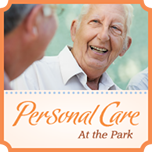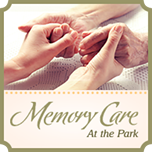Alzheimer’s and dementia are a scary disease. What makes it so scary is the fact that it’s not totally understood. Teams of researchers have tried for years to decipher the disease and figure out what causes it and what we can do to stop it. Unfortunately, there is no miracle cure just yet. However, that doesn’t mean those with the disease must completely lose all quality of life. Luckily, there are communities such as Memory Care at the Park, where seniors can continue to maintain the best quality of life possible living with Alzheimer’s or dementia.
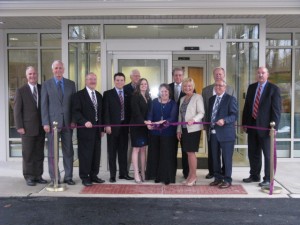 On Thursday, November 12th local legislators and representatives from the Alzheimer’s Association looked onward as members from Gloria Dei Communities Corporation unveiled the latest expanded facilities for Memory Care at the Park. In attendance included: State Senator Stewart Greenleaf; State Representative Thomas Murt; U.S. Representative Brendan Boyle; Associate Director of Clinical Services for the Delaware Valley chapter of the Alzheimer’s Association, Kerry Brown; CEO of Gloria Dei Senior Communities, Vincent Dattilo; and the President of Gloria Dei Senior Communities, Susan Wright.
On Thursday, November 12th local legislators and representatives from the Alzheimer’s Association looked onward as members from Gloria Dei Communities Corporation unveiled the latest expanded facilities for Memory Care at the Park. In attendance included: State Senator Stewart Greenleaf; State Representative Thomas Murt; U.S. Representative Brendan Boyle; Associate Director of Clinical Services for the Delaware Valley chapter of the Alzheimer’s Association, Kerry Brown; CEO of Gloria Dei Senior Communities, Vincent Dattilo; and the President of Gloria Dei Senior Communities, Susan Wright.
Why were there so many important people on hand for the grand opening and ribbon cutting ceremony? It is because dementia and Alzheimer’s disease have silently become an epidemic here in America. Every 70 seconds someone new develops Alzheimer’s. When you combine all of the various types of dementias together, you get about 35 million people diagnosed with some form of a cognitive disease. That number is entirely too high, and it’s nice to see so many prominent figures within the community who are willing to standup against this disease and raise awareness in order to fight it.
 Gloria Dei has not only doubled its capacity to aid those who are living with the disease, but they have also donated $10,000 to the Delaware Valley chapter of the Alzheimer’s Association. Kerry Brown, Associate Director of Clinical Services, was on hand in order to receive this charitable donation and to be a part of the ribbon cutting ceremony.
Gloria Dei has not only doubled its capacity to aid those who are living with the disease, but they have also donated $10,000 to the Delaware Valley chapter of the Alzheimer’s Association. Kerry Brown, Associate Director of Clinical Services, was on hand in order to receive this charitable donation and to be a part of the ribbon cutting ceremony.
These 21 new residences, coupled with the 21 already existing residences, will bring much needed top quality care to individuals living with dementia or Alzheimer’s disease. There is no reason as to why someone’s quality of life cannot continue after they are diagnosed with a cognitive disease. Gloria Dei Communities has always employed a mission that involves the highest level of person-centered care, while also preserving our resident’s dignity.
Around the time history began to be recorded, the color purple was an important one. The dye that was used to create the color was extremely hard to come by. As a result, if you owned a cloak or a sash that was purple, it usually meant you were of big importance, such a royalty.
Perhaps it’s no coincidence that National Alzheimer’s Disease Awareness Month, a month dedicated to raising awareness for our elderly loved ones who are living with the disease, also uses the color purple. In a way, our elderly loved ones are a lot like royalty. They’re wise, they have plenty of experience in life, and they deserve our adoration. Here are a few helpful pointers when it comes to celebrating Alzheimer’s Awareness Month.
Donate
The problem with this disease is that there are still so many questions that need to be answered. We understand a bit about how Alzheimer’s disease operates, but we don’t really know the root causes of it. The only way we can answer these important questions to this disease is research.
The more research we do, the more likely we are to cure it. That’s why donations are a great help during Alzheimer’s Awareness Month. Scientists, through clinical research, have discovered some very promising data, but there is nothing for certain that can completely cure this cognitive disorder. Not until we do more research!
Promote
It’s okay if you don’t have the necessary funds to donate to certain Alzheimer’s organizations. You can always do the next best thing: Promote awareness! There are a multitude of events that people put on during the month of November.
Whether it is a 5K run, a half-marathon, or even just someone’s personal crowdfunding page, through social media, it’s very easy to share and spread awareness. And it’s always appreciated! Of course, if social media is not your preferred platform, word of mouth works just as well. Let people know the importance of this month in anyway possible.
Organize
Perhaps you’re not the type of person who wants to sit back and passively donate or passively promote. Maybe you want to be on the frontline leading the cause and spreading awareness. If that’s the case, then organizing an event is your best option. There are a lot of websites out there that can help you do just that.
Specific organization will help you put together your event, as well as gather certain Alzheimer’s associations as sponsors. This will help you achieve a greater amount of monetary donations in order to further research developments within the field of dementia and, more specifically, Alzheimer’s disease.
Of course, organizing an event is not the only way you can celebrate National Alzheimer’s Disease Awareness Month. You can donate and you can promote. Or you can do all three! But you really should do something. Alzheimer’s disease is a terrible disorder. It robs us of our most precious possessions: Our memories.
It affects 5.3 million Americans right now, and that number is only predicted to increase. It’s the 6th leading cause of death in the United States and it’s the only disease in the top ten causes of death that cannot be prevented, cured, or slowed. We need to spread awareness about this disease. That’s why it’s so important to celebrate this 30-day observation. And you can do so by donating, promoting, or organizing your own event!
If you’re watching any sporting event in the month of October, you’ll notice one thing: most, if not all, of the athletes are wearing pink. Whether it’s a glove, a wristband, or even the jersey altered to have the color in there, everyone is wearing pink. What does the streak of pink represent? It represents Breast Cancer Awareness Month! The entire month of October is dedicated to raising awareness for the disease. In honor of this 31-day adherence we’d like to offer some helpful tips, in order to prevent the disease or catch it at an early stage.
Know Your Risk
- Some women have a higher risk of getting breast cancer. A lot of it depends on family history, as well as your age and your weight. As a result, you may have to get MRI scans in addition to your mammogram screening to help better detect any possible cancer cells. To know your risk ask your doctor. He or she will ask you some questions about your family history as well as your current health and diet.
Diet and Exercise
- Recent studies have shown that obesity raises the risk for breast cancer in women after menopause. The best way to reduce unwanted pounds is to diet and exercise. 30 minutes every day of aerobic or anaerobic exercises is enough to keep your heart healthy and your muscles strong. When it comes to your diet portions are important. The growing trend is that portions are becoming bigger and bigger which is bad for your calorie intake. Luckily, there are guides to help when it comes to proper portions, such as your hands. A single serving size of fruit should be the size of your fist, meat, fish, or poultry should be the size of your palm, and a single serving of cheese should be the size of your thumb. It may seem pretty skimpy but those are the correct portions for a healthy diet.
Screenings
- Doctor’s office can be quite frightful. We understand that. However, you should not put off getting a mammogram due to fear of discomfort. And you should not put off getting a mammogram from fear of the results. Get checked and get checked often. It’s important to choose a doctor wisely. Pick someone you feel comfortable seeing. This will help when it comes to scheduling appointments and showing up. A good doctor can make the whole experience pleasant!
Drop the Habits
- Alcohol and smoking increase your chance of getting breast cancer. If you smoke, it’s best to quit now. The mentality, “it’s too late now,” does not apply. Anytime is a good time to quit smoking. You should do it sooner rather than later, and if you don’t smoke, don’t start. It’s a nasty habit.
Alcohol increases your chances of getting breast cancer. It’s recommended that you limit yourself to only one drink a night, no matter what the type of alcohol it is. However, it’s probably best to drop alcohol altogether. It can worsen conditions like osteoporosis or it can interfere with your medicine.
Unfortunately, there is no magical cure for breast cancer. It would be nice to have a pill you can take that prevents the disease. However, you can reduce your chances of getting breast cancer by carefully monitoring your overall health and watching what you eat. Not to mention, your chances of beating breast cancer if detected early, increase as more and more research is being done. However, we can still work towards finding that miracle cure by raising money and raising awareness!
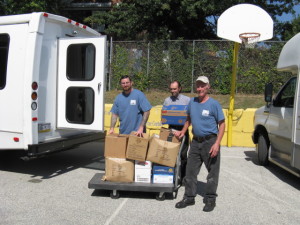 Recently, residents of Gloria Dei Senior Communities donated much needed school supplies through the CARES Community Outreach program to several deserving elementary schools. Several busloads of Gloria Dei residents began their day visiting the John H. Webster Elementary School located in the Frankford section of Philadelphia. A wide range of school supplies were delivered during the visit while Gloria Dei residents had the opportunity to interact with the students by visiting a number of classrooms. Residents were also treated to a singing program performed by the students lead by the school’s music instructor.
Recently, residents of Gloria Dei Senior Communities donated much needed school supplies through the CARES Community Outreach program to several deserving elementary schools. Several busloads of Gloria Dei residents began their day visiting the John H. Webster Elementary School located in the Frankford section of Philadelphia. A wide range of school supplies were delivered during the visit while Gloria Dei residents had the opportunity to interact with the students by visiting a number of classrooms. Residents were also treated to a singing program performed by the students lead by the school’s music instructor.
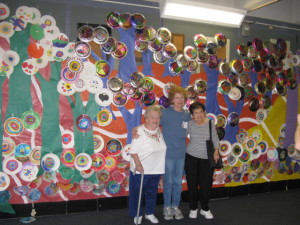 Following a break for lunch, Gloria Dei residents then made their way to the Joseph K. Gotwals Elementary School in Norristown, Montgomery County. Once again, much needed school supplies were delivered for the students’ use. Gloria Dei residents were then escorted to several classrooms with the opportunity to view classes in session and witness innovative teaching techniques being utilized by classroom teachers. In each classroom, students took time to directly thank the Gloria Dei residents for their caring and generosity.
Following a break for lunch, Gloria Dei residents then made their way to the Joseph K. Gotwals Elementary School in Norristown, Montgomery County. Once again, much needed school supplies were delivered for the students’ use. Gloria Dei residents were then escorted to several classrooms with the opportunity to view classes in session and witness innovative teaching techniques being utilized by classroom teachers. In each classroom, students took time to directly thank the Gloria Dei residents for their caring and generosity.
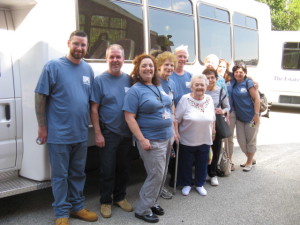 The CARES Community Outreach program is fully funded and initiated by the residents of Gloria Dei Communities who donate their time and funds to provide needed school supplies through its Tools For Schools program. Each year, several deserving schools in under served neighborhoods are selected to receive the donations. Gloria Dei Community residents take great pride in providing assistance each year and giving back to needy communities.
The CARES Community Outreach program is fully funded and initiated by the residents of Gloria Dei Communities who donate their time and funds to provide needed school supplies through its Tools For Schools program. Each year, several deserving schools in under served neighborhoods are selected to receive the donations. Gloria Dei Community residents take great pride in providing assistance each year and giving back to needy communities.
Although scientists are uncertain about the reasons behind dementia, they do know that it is caused by a lack of or blocked connections within the brain. For some reason they stop forming or even become destroyed which makes it difficult for information to be transported or processed. As a result, learning and remembering become incredibly difficult.
However, there is some research out there that suggests keeping the mind active can prevent the destruction of brain cells and the connections they create. Unfortunately, it is not 100% certain it will protect you. Nevertheless, it is your best defense against dementia or Alzheimer’s disease. By no means is loss of memory a normal part of aging. By keeping the mind spry you can create new brain cells and maintain their connections. Here are a few ways to do so!
- Read and Write
There is no better way to keep the mind active than continuously reading and writing. Plus, there are so many different activities you can do to achieve this. Perhaps you really enjoy world politics? Pick up a newspaper, scour an online blog, or pick up the latest biography on a US President. After you’re done reading one of those things on a topic you enjoy, make sure to keep a pen and notebook handy. Scribble some notes down about what you just read so it sticks in your mind. It’s a good activity to do for just 30 minutes a day. It’s kind of like exercise. Your brain is also a muscle that needs to be stretched and strengthened. - Puzzles
Jigsaw, Sudoku, and crossword puzzles are all great means to exercise the brain. In fact, it’s good to try to do all three! The more variations you include in your brain games the more likely you are to keep the mind sharp. It’s like keeping your portfolio balanced when investing in the stock market. You’ll never be slumping in one area. Crossword puzzles help you maintain control over words and language, jigsaw puzzles help with special recognition, and Sudoku helps with numbers and recognition of patterns. These are all important items that add up to a keen wit. - Learn Something New
Have you ever tried to learn Spanish? What about a musical instrument? It’s not a bad idea to try and pick it back up. By learning something new you’re creating fresh connections within the cells of your brain (neurons). This helps keep the brain poised to send information, as opposed to passively performing an activity such as watching TV. Yes, there are educational programs out there that present a lot of information. However, that simply deals with memory. The brains takes that information it just learned and compartmentalizes it into the storage area of the brain where it can be easily forgotten. When you’re performing a new activity or learning a new skill, the brain is legitimately growing. This concept is called neuroplasticity. Essentially what it means is that intelligence is not fixed, rather it’s forming and developing throughout our lives. - Attend a Class
This goes hand in hand with number 3. By attending a class you’ll be learning something new as well as going out into social settings and interacting with new people. Socializing has a great effect on the brain. It helps keep us on our toes, especially if we’re interacting with new people. There are new social situations and varying conversations as opposed to the “How’s your day?” and “What’s new?” kind of conversations we have with people we see every day.If you’ve ever been interested in learning how to make pottery or become if you’re looking to become a better painter, now is a good time to try it out. No one said there’s an age restriction when it comes to taking classes. Plenty of communities offer painting classes, cooking classes, and many more!
- Keep Learning
There is no cap to learning. You don’t just stop when you finish school. We learn something new everyday, and this is your best defense against dementia like disease. Of course, you can’t just read for 10 hours a day and expect to have perfect mental health when you reach the age of 80. It requires diligent work on your part, as well as diet and exercise. However, if you keep up with your yearning for learning, daily walks, and healthy meals, there’s scientific evidence to back up your belief that you’re adding quality to your life in the later years.
If you don’t know what Sundowner’s Syndrome is, that’s okay. However, indirectly you might know exactly what is if your loved one has Alzheimer’s disease or another form of dementia.
If you happen to notice your aging loved one getting moodier and more anxious as the sun goes down, then you’ve notice what Sundowner’s Syndrome is. It occurs in the evening and causes confusion. It seems simple enough, but the mind is incredibly complicated. It’s normal for someone with dementia to be confused, but this added condition could make matters much worse.
As stated earlier, confusion is normal for someone with a neurodegenerative disease, but in the evening the mind is tired, over stimulated, and often times overwhelmed. This leads to unusual behavior in a person whose mind can’t keep up with everything that happens at night.
Luckily, now that you know what Sundowner’s Syndrome is, you can learn what to expect and how to control it a little bit better when seeing or visiting a loved one with Alzheimer’s disease or dementia. Here are a few tips to simmer down Sundowner’s Syndrome.
Maintain a Routine
The more you keep your loved one to an established routine the less confusion occurs during the morning, afternoon, and evening. It lowers the amount of surprise each day, which is good for a person with dementia. The more relaxed they feel about a situation the less likely they’ll be in a state of anxiety.
This includes a bedtime. If bedtime is a concrete hour that happens day in and day out, the mind gets used to it. The hassle that occurs when trying to get a loved one to calm down before bed, won’t be entirely erased, but less likely to happen if they go to bed at the same time every day.
Stay Active
Keeping active is good for anyone at any age. However, not only do you need to workout the body, but you need to workout the mind as well. That’s why it’s a good idea to fill your day with stimulating activities for the body and mind. There are plenty of options such as:
- Going to a museum
- Going to an art museum
- Going for a walk
- Bird watching
- Gardening
And there are plenty more! By keeping active with your senior loved one, you’re encouraging a good healthy lifestyle that keeps the mind stimulated, as well as the body. This aids with the prevention of Sundowner’s Syndrome, because the better fit the body and mind are the less likely you are to see signs of the syndrome.
Play Soothing Music
Recently, music has been at the forefront of Alzheimer’s and dementia research. It provides moments of clarity to those in the late stages of dementia. It’s also very soothing. It’s soothing to those who are in the late stages of dementia, to those in the early stages of dementia, and to those who don’t even have dementia.
It’s incredibly relaxing to hear a familiar tune, especially something from your childhood that brings back fond memories. It’s incredible how you can hear just one song and instantly some moment of your life is immediately brought to your mind.
Now, imagine being unable to remember what you had for breakfast or what you did in the afternoon, and you hear a familiar tune that brings you back to your childhood. You may be outside playing with a sibling in the summer sun or sitting around the dinner table making jokes with your parents. That’s what it’s like for someone with dementia or Alzheimer’s disease when they reach a moment of clarity listening to music.
It provides deep brain stimulation that makes it feel good to remember. It’s like stretching a part of your body that hasn’t been used in a while. It can help a loved one who is over anxious from Sundowner’s Syndrome. Ask them about their favorite music, create a playlist, and whenever you notice their behavior is a little out of the ordinary play it for them. It might be the medicine you’ve been looking for all along!
We understand how difficult it can be when assessing an aging loved one. It’s even more difficult having that conversation. However, if you do need a little help knowing when your loved one may need to move into a Personal Care or Memory Care community, take a look below. These are the warning signs that can help indicate when it’s time. They are as follows:
Difficulty with the Familiar
Have you noticed a parent or loved one struggling with familiar tasks they used to do with ease? Perhaps they had a special recipe they always liked to cook? Or maybe there was a specific way they cleaned the house, but are now struggling to remember the right way. If this is the case, it may mean they’re struggling to maintain their independence due to cognitive decline.
Some people believe that this is just another part of aging and there’s nothing anyone can do about it. That’s not the case. Cognitive decline can be prevented and even reversed as we age. Older adults just require more mental activity and stimulation than a person who is younger. That’s why, when you notice some mental decline, it’s best to think about an assisted living situation.
Your parent or elderly loved one will not be isolated in their own home. They’ll be apart of a community in which they share similar interests with everyone, partake in activities, and keep their minds active and stimulated. It’s a great way to keep their minds sharp and their hearts young!
Cluttered Home
If you notice your loved one’s house is messy, it may be a sign that it’s time for them to move out. A house requires a lot of upkeep. The carpets needs to be vacuumed, dishes have to be cleaned and put back in the cupboards, hardwood floors should be mopped, etc., etc. It’s a lot of work for anyone and, it can grow to be too much for an elderly loved one.
You may see a bunch of dirty dishes in the sink or piles of clothes lying around the house. Ask them about it. Get to know their thoughts on what it’s like living in their own home. They may flat out tell you that they don’t like it. That’ll make your job a lot easier when deciding on whether they should move to a retirement community. They may tell you that everything is fine and you just caught them on an off day, but it’s important to be stern yet compassionate with them. Let them know that you want to help.
Losing Weight
If a parent or loved one is experiencing noticeable weight loss, it could stem from a number of problems.
- They can no longer cook
- They no longer have an appetite from their medicine
- They have depression
These three things are serious problems. For instance, if a parent or older loved one is having mobility problems, leading them to cook less, that results in more takeout food which isn’t as healthy as home cooked meals. It may also mean that they’re just not eating at all, receiving fewer nutrients to keep them happy and healthy.
The second problem, their medicine reducing their taste buds abilities, can result in a loss of appetite. This will also keep a senior from eating as much as they should, causing them to take in fewer vitamins and nutrients that they need.
Thirdly, if a senior loved one has depression, not only do they eat less, but they’ll be reluctant to partake in any of their favorite activities. If so, a senior community is perfect for them. It keeps them from getting lonely, a common side effect of depression.
As we mentioned earlier, they’ll be placed into a community that is welcoming and shares similar interests in the activities your loved one likes to do. They will no longer have extraneous tasks to keep their living quarters tidy, meals will be prepared for them, and they’ll have the loving support of the workers and community surrounding them. Therefore, if you’ve noticed some of these warning signs in your parent or loved one, it might be best to start talking to them about an assisted living community.
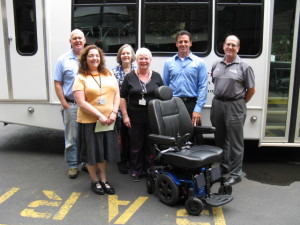
(From left to right) Kevin Smith, Maintenance Assistant; Miranda Wagner, Assistant Administrator; Donna Marie Saul, Director of Education and Resident Services; Elizabeth Williams, Community Administrator; Dan Clower, Sunrise Medical Account Manager; Joe Vanleer, Delcrest Medical Services Sales Associate








